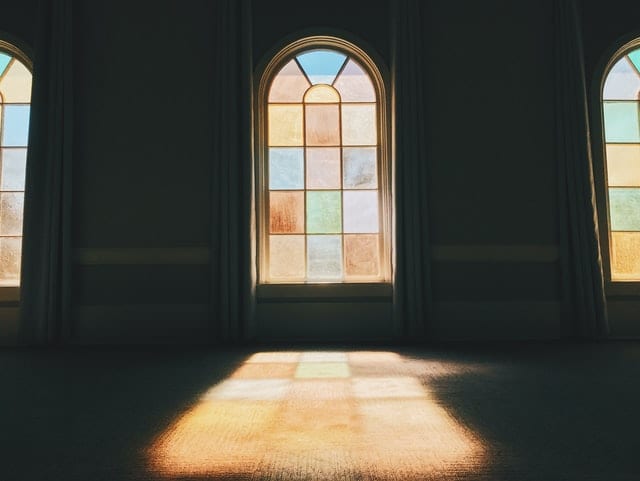Here it is, Saturday. And here we sit, waiting to see if he’s going to get up again.
“Sunday’s coming,” so they say. But this year, that doesn’t feel exactly, precisely true. At least not in the usual way.
Good Friday… now THAT felt real. Real as anything. Far too real for words. The death and the darkness were not figurative this year. We did not have to imagine ourselves into a place of grieving. The body count on the nightly news does that work for us.
The liminal space of this Saturday seems fitting as well. We can easily place ourselves into this part of the story; indefinite waiting with no end date to mark on the calendar, and no clear picture of what “after” might even look like if we could name such a day? Sounds about right.
And yes, Sunday is coming. The sun will rise tomorrow. We will worship in our homes– much like the disciples on the first Easter who were still, three days after the violent death of their friend and teacher, afraid to stick their noses out for fear of their own lives. We will find small joys and celebrate that the gospel promise of resurrection still stands– with or without the brass band, the big crowd, or the bunny.
We are allowed to grieve these traditions. Even if they seem small in the grand scheme of things right now, and even if we know that “resurrection,” as such, can happen without them. The celebration is part of the story, and part of who we are as people of faith. Of course things feel different this year. There’s no need to pretend that the loss doesn’t leave a mark on us.
But here is the hard truth I’m sitting with today, in this liminal space of Saturday: we go through the motions, these rituals of remembrance, grief and celebration, every year. They are meaningful and they are important. But do they ever really change us?
That may be a complicated question, but I’m going to venture that for most of us, the short answer is: not really. Because to truly experience ‘resurrection,’ something has to die.
Maybe this year, what needs to die is the Church.
Or at least, Church as we’ve known it. And I say this as a person who loves the Church. Lord knows, it ain’t perfect, but I love it still. I love the energy of gathering before worship, and I love worship itself; I love fellowship time, whether it’s coffee hour, a full-on potluck, or an informal gathering in parking lot. I love youth group, and choir practice and even– I never in life thought I’d say this but EVEN– church meetings. Within reason. I mean, I don’t need to go to one every night. But having gone a few months without one, I miss even that. I love the complicated relationships; the often pieced-together but we-do-it-out-of-love mission projects; I dearly love a good church lady function. And I love all of the people who work so hard, all the time, to make all of this life happen.
So. Having established that I am a person who deeply loves the church, I hope I can say and it will be heard as coming from a place of love… maybe the Church needs to die. Maybe, in fact, that is the only way it can truly be resurrected after this crisis has passed.
We all know that once this is over and we can go back to “normal,” normal will not be what it was. That’s why the uncertainty of Saturday feels so heavy this year; we are living with it all the time now. We know that this experience will leave a mark on all of us, and on all of our institutions.
Which is why this crisis might truly be an opportunity– an invitation, even– to experience resurrection like we’ve never known it before. But first, we have to experience death. That death, in many ways, is being forced upon us in ways we didn’t ask for. Some individual congregations will not survive the financial strain of this season, and that will be a tragedy. But that kind of death what I’m talking about. I’m talking the death of “big C” Church. The institution itself. The thing that has been built by the empire; the creature so closely entwined with capitalism we can scarcely tell them apart sometimes; the thing that has benefitted from the silencing of women and minorities for generations; the monolith to white male power and authority that continues to do more harm than good in many of its expressions. These are things that need to die.
Some of our internal structures need to fall away too, because they were built out of secular, corporate expectations. Some of our policies and ideologies need to die because they were built on ancient assumptions that no longer serve us. Some of our institutional privileges need to die away because our desire to be dominant has trumped our desire to be faithful.
For those of us who love church, the scary thing is this: if we want to witness real resurrection, we may have to let some good things die too. This season of uncertainty and exile has reordered life as we know it; in many ways, that death is being forced upon us. Maybe the best thing people of faith can do is let go of all expectations about what our faith communities and practices will look like after this. If we can release our attachment to old ways, let go of expectations of success and normalcy, and let go all the old measurements of faithfulness… we might witness a miracle the likes of which we would not have let ourselves imagine before.
If we can do that– just let it all die– then there will be a season when we can rebuild the things that are worthy of resurrection. What might that look like? We don’t really know, and that’s the beauty of it. But maybe we make room at the table for people we wasted energy keeping out before. Maybe we rewrite the bylaws in a way that enables mission without burying us in minutiae. Maybe we can preach a bold gospel that calls out the evils of poverty and racism, instead of a comforting, inspirational piece that protects the powerful and the status quo.
Maybe we will get our hands in the dirt. Maybe we will invest more in the environment than the sound system. Maybe we’ll learn what it means to lose our lives to find it.
Maybe, as Wendell Berry says– we will “practice resurrection.”
The truth is, it’s going to be Saturday for a long time. Maybe “practicing” is all we can do right now. This particular resurrection is not going to run on our timeline, and it’s not going to show up tomorrow morning just because we get up and put on our nice clothes. We are in perpetual liminal space for now, waiting for new life to surprise us. If we do this right, we have the same opportunity as those first disciples– to build something new, create a new community with new practices and traditions, around no certainty but this single truth: Jesus died, but lived again.













